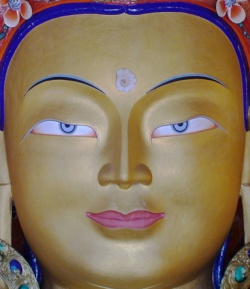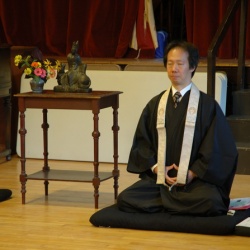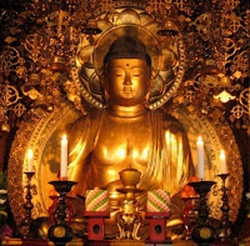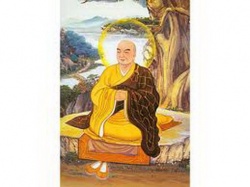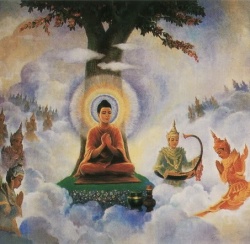Spirituality
The term spirituality lacks a definitive definition, although social scientists have defined spirituality as the search for "the sacred," where "the sacred" is broadly defined as that which is set apart from the ordinary and worthy of veneration.
The use of the term "spirituality" has changed throughout the ages. In modern times spirituality is often separated from religion, and connotes a blend of humanistic psychology with mystical and esoteric traditions and eastern religions aimed at personal well-being and personal development.
The notion of "spiritual experience" plays an important role in modern spirituality, but has a relatively recent origin.
Definition
Several authors state that there is no definitive definition of spirituality.
The re-formation aims to recover the original shape of man, the image of God. To accomplish this, the re-formation is oriented at a mold, which represents the original shape: in Judaism the Torah, in Christianity Christ, in Buddhism Buddha, in the Islam Muhammad.
In modern times "spirituality" has acquired a new meaning. It still denotes a process of transformation, but is often seen as separate from religious institutions, as "spiritual but not religious." Spirituality has come to mean the internal experience of the individual. According to Yuk-Lin Renita Wong and Jana Vinsky, religion represents the organized aspect, the institutions which press people into a mold. Dick Houtman and Stef Aupers write that modern spirituality blends humanistic psychology with mystical and esoteric traditions and eastern religions.
Social scientists have defined spirituality as the search for "the sacred," where "the sacred" is broadly defined as that which is set apart from the ordinary and worthy of veneration, for example "a transcendent dimension":
[...] a transcendent dimension within human experience [...] discovered in moments in which the individual questions the meaning of personal existence and attempts to place the self within a broader ontological context.
Spirituality can be sought not only through traditional organized religions, but also through movements such as the feminist theology and green politics. Spirituality is also now associated with mental health, managing substance abuse, marital functioning, parenting, and coping. It has been suggested that spirituality also leads to finding purpose and meaning in life.
Development of the meaning of spirituality
Classical and medieval meaning
Words translatable as 'spirituality' first began to arise in the 5th century and only entered common use toward the end of the Middle Ages.
The term "spirituality" is derived from the Latin spiritualitas and the Biblical "roeach/pneuma". It means to be put in motion, to be a living person, and being driven. In a Bibilical context it means being animated by God. Spirituality means to be driven by the Holy Spirit, as opposed to a life which rejects this influence.
In the 11th century this meaning changes. Spirituality denotes then the mental aspect of life, as opposed to the material and sensual aspects of life. Spirituality represents "the ecclesiastical sphere of light against the dark world of matery".
In the 13th century "spirituality" acquired a social and psychological meaning. Socially it denoted the territory of the clergy: "The ecclesiastical against the temporary possessions, the ecclesiastical against the secular authority, the clerical class against the secular class" Psychologically it denoted the realm of the inner life: "The purity of motives, affections, intentions, inner dispositions, the psychology of the spiritual life, the analysis of the feelings".
Early-modern meaning
In the 17th and 18th century a distinction was being made between higher and lower forms of spirituality:
A spiritual man is one who is Christian 'more abundantly and deeper than others'.
But the word was also associated with mysticism and quietism, and acquired a negative meaning.
Modern spirituality
The spread of the ideas of modernity began to diminish the role of religion in society and in popular thought. Ralph Waldo Emerson (1803–1882) was a pioneer of the idea of spirituality as a distinct field.
Important early 20th century western writers who studied the phenomenon of spirituality, and their works, include William James, The Varieties of Religious Experience (1902), and Rudolph Otto, especially The Idea of the Holy (1917).
Due to the colonisation of Asia by the western world, since the 19th century an exchange of ideas has been taking place between the western world and Asia, which also influenced western religiosity. A major influence on modern spirituality was the Theosophical Society, which searched for 'secret teachings' in Asian religions. It has been influential on modernist streams in several Asian religions, notably Neo-Vedanta, the revival of Theravada Buddhism, and Buddhist modernism, which have taken over modern western notions and integrated them in their religious concepts. The influence of Asian traditions on western modern spirituality was also furthered by the Perennial Philosophy, whose main proponent Aldous Huxley was deeply influenced by by Vivekanda's Neo-Vedanta and Universalism , and the growing wellfare, education and mass travel after World war Two.
After the Second World War spirituality and religion became disconnected. ] A new discourse developed, in which (humanistic) psychology, mystical and esoteric traditions and eastern religions are being blended, to reach the true self by self-disclosure, free expression and meditation.
The distinction between the spiritual and the religious became more common in the popular mind during the late 20th century with the rise of secularism and the advent of the New Age movement. Authors such as Chris Griscom and Shirley MacLaine explored it in numerous ways in their books. Paul Heelas noted the development within New Age circles of what he called "seminar spirituality": structured offerings complementing consumer choice with spiritual options.
Among other factors, declining membership of organized religions and the growth of secularism in the western world have given rise to this broader view of spirituality. The term "spiritual" is now frequently used in contexts in which the term "religious" was formerly employed.
Traditional spirituality
Hinduism
The Hindu traditions know a wide range of spiritual practices called Sādhanā, aimed at reaching moksha or enlightenment. Sadhana literally "a means of accomplishing something", is an ego-transcending spiritual practice. It includes a variety of disciplines in Hindu, Sikh, Buddhist and Muslim traditions that are followed in order to achieve various spiritual or ritual objectives.
The historian N. Bhattacharyya provides a working definition of the benefits of sādhanā as follows:
... religious sādhanā, which both prevents an excess of worldliness and molds the mind and disposition (bhāva) into a form which develops the knowledge of dispassion and non-attachment. Sādhanā is a means whereby bondage becomes liberation.
Iyengar (1993: p. 22) in his English translation of and commentary to the Yoga Sutras of Patanjali defines sādhanā in relation to abhyāsa and kriyā:
Sādhanā is a discipline undertaken in the pursuit of a goal. Abhyāsa is repeated practice performed with observation and reflection. Kriyā, or action, also implies perfect execution with study and investigation. Therefore, sādhanā, abhyāsa, and kriyā all mean one and the same thing. A sādhaka, or practitioner, is one who skillfully applies...mind and intelligence in practice towards a spiritual goal.
Buddhism
Main article: Buddhism
Buddhist practices are known as Bhavana, which literally means "development" or "cultivating" or "producing" in the sense of "calling into existence." It is an important concept in Buddhist praxis (Patipatti). The word bhavana normally appears in conjunction with another word forming a compound phrase such as citta-bhavana (the development or cultivation of the heart/mind) or metta-bhavana (the development/cultivation of lovingkindness). When used on its own bhavana signifies 'spiritual cultivation' generally.
Various Buddhist Paths to liberation developed throughout the ages. Best-known is the Noble Eightfold Path, but others include the Bodhisattva Path and Lamrim.
Modern spirituality
Main article: New Age
The term "spiritual" is now frequently used in contexts in which the term "religious" was formerly employed. Modern spirituality is also called "post-traditional spirituality" and "New Age spirituality".
Hanegraaf makes a distinction between "New Age sensu stricto" and "New Age Sensu lato". "New Age sensu stricto"(in a strict sense) originated in the 1950s as a group of people who expected a radical change of culture. "New Age Sensu lato" (in a wide sense) emerged in the later 1970s,
...when increasing numbers of people [...] began to perceive a broad similarity between a wide variety of "alternative ideas" and pursuits, and started to think of them as part of one "movement"".
This perception of similarities is a defining characteristic of New Age , modern spirituality and Nondualism.
Those who speak of spirituality outside of religion often define themselves as spiritual but not religious and generally believe in the existence of different "spiritual paths," emphasizing the importance of finding one's own individual path to spirituality. According to one 2005 poll, about 24% of the United States population identifies itself as spiritual but not religious.
Characteristics
Modern spirituality is centered on the "deepest values and meanings by which people live." It embraces the idea of an ultimate or an alleged immaterial reality. It envisions an inner path enabling a person to discover the essence of his/her being.
Not all modern notions of spirituality embrace transcendental ideas. Secular spirituality emphasizes humanistic ideas on moral character (qualities such as love, compassion, patience, tolerance, forgiveness, contentment, responsibility, harmony, and a concern for others. :22 These are aspects of life and human experience which go beyond a purely materialist view of the world without necessarily accepting belief in a supernatural reality or divine being.
Personal well-being, both physical and psychological, is an important aspect of modern spirituality. Contemporary authors suggest that spirituality develops inner peace and forms a foundation for happiness. Meditation and similar practices may help any practitioner cultivate his or her inner life and character. Ellison and Fan (2008) assert that spirituality causes a wide array of positive health outcomes, including "morale, happiness, and life satisfaction." Spirituality has played a central role in self-help movements such as Alcoholics Anonymous:
...if an alcoholic failed to perfect and enlarge his spiritual life through work and self-sacrifice for others, he could not survive the certain trials and low spots ahead....
Spiritual experience
Main article: Religious experience
"Spiritual experience" plays a central role in modern spirituality. ] This notion has been popularised by both western and Asian authors.
William James popularized the use of the term "religious experience" in his The Varieties of Religious Experience. It has also influenced the understanding of mysticism as a distinctive experience which supplies knowledge.
Wayne Proudfoot traces the roots of the notion of "religious experience" further back to the German theologian Friedrich Schleiermacher (1768–1834), who argued that religion is based on a feeling of the infinite. The notion of "religious experience" was used by Schleiermacher to defend religion against the growing scientific and secular citique. It was adopted by many scholars of religion, of which William James was the most influential.
Major Asian influences were Vivekananda and D.T. Suzuki. Swami Vivekananda popularised a modern syncretitistic Hinduism , in which the authority of the scriptures was replaced by an emphasis on personal experience. D.T. Suzuki had a major influence on the popularisation of Zen in the west and popularized the idea of enlightenment as insight into a timeless, transcendent reality. Another example can be seen in Paul Brunton's A Search in Secret India, which introduced Ramana Maharshi to a western audience.
Spiritual experiences can include being connected to a larger reality, yielding a more comprehensive self; joining with other individuals or the human community; with nature or the cosmos; or with the divine realm.
Spiritual practices
Main article: Spiritual practice
Waaijman discerns four forms of spiritual practices:
Somatic practices, especially deprivation and diminishment. The deprivation purifies the body. Diminishment concerns the repulsement of ego-oriented impulses. Examples are fasting and poverty.
Psychological practices, for example meditation.
Social practices. Examples are the practice of obedience and communal ownership reform ego-orientedness into other-orientedness.
Spiritual. All practices aim at purifying the ego-centeredness, and direct the abilities at the divine reality.
Spiritual practices may include meditation, mindfulness, prayer, and the contemplation of sacred texts; ethical development. Love and/or compassion are often described as the mainstay of spiritual development.
Within spirituality is also found "a common emphases on the value of thoughtfulness, tolerance for breadth and practices and beliefs, and appreciation for the insights of other religious communities, as well as other sources of authority within the social sciences."
Science
Antagonism
Since the scientific revolution, the relationship of science to religion and spirituality has developed in complex ways. Historian John Hedley Brooke describes wide variations:
The natural sciences have been invested with religious meaning, with antireligious implications and, in many contexts, with no religious significance at all."
The popular notion of antagonisms between science and religion has historically originated with "thinkers with a social or political ax to grind" rather than with the natural philosophers themselves. Though physical and biological scientists today avoid supernatural explanations to describe reality , many scientists continue to consider science and spirituality to be complementary, not contradictory.
Holism
Main article: Holism
During the twentieth century the relationship between science and spirituality has been influenced both by Freudian psychology, which has accentuated the boundaries between the two areas by accentuating individualism and secularism, and by developments in particle physics, which reopened the debate about complementarity between scientific and religious discourse and rekindled for many an interest in holistic conceptions of reality. :322 These holistic conceptions were championed by New Age spiritualists in a type of quantum mysticism that they claim justifies their spiritual beliefs, though quantum physicists themselves on the whole reject such attempts as being pseudoscientific.
Scientific research
Neuroscientists are trying to learn more about how the brain functions during reported spiritual experiences.
The psychology of religion uses a variety of metrics to measure spirituality.
In keeping with a general increase in interest in spirituality and complementary and alternative treatments, prayer has garnered attention among some behavioral scientists. Masters and Spielmans have conducted a meta-analysis of the effects of distant intercessory prayer, but detected no discernible effects.
